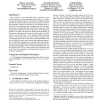Free Online Productivity Tools
i2Speak
i2Symbol
i2OCR
iTex2Img
iWeb2Print
iWeb2Shot
i2Type
iPdf2Split
iPdf2Merge
i2Bopomofo
i2Arabic
i2Style
i2Image
i2PDF
iLatex2Rtf
Sci2ools
134
click to vote
MOBICOM
2009
ACM
2009
ACM
Interference management via rate splitting and HARQ over time-varying fading channels
The coexistence of two unlicensed links is considered, where one link interferes with the transmission of the other, over a timevarying, block-fading channel. In the absence of fading, standard information-theoretic results for the scenario at hand prove the sumrate optimality of single-user detection or joint decoding at the interfered receiver, depending on the instantaneous value of the interference power. These results hinge critically on the presence of full channel state information at some of the nodes. In this paper, the problem is revisited with quasi-static fading and in the absence of channel state information at the nodes by assuming that: (i) HARQ type-I is used at both links; (ii) the channels exhibit Markovian memory over the time-slots; (iii) ACK/ NACK messages of the two HARQ processes are received at the interfering transmitter and used to adapt the current access strategy and transmission parameters. The problem is formulated as a Partially Observable Markov Decisio...
Channel State Information | Communications | Interference Management | MOBICOM 2009 | Partially Observable Markov Decision Process |
| Added | 28 May 2010 |
| Updated | 28 May 2010 |
| Type | Conference |
| Year | 2009 |
| Where | MOBICOM |
| Authors | Marco Levorato, Osvaldo Simeone, Urbashi Mitra |
Comments (0)

